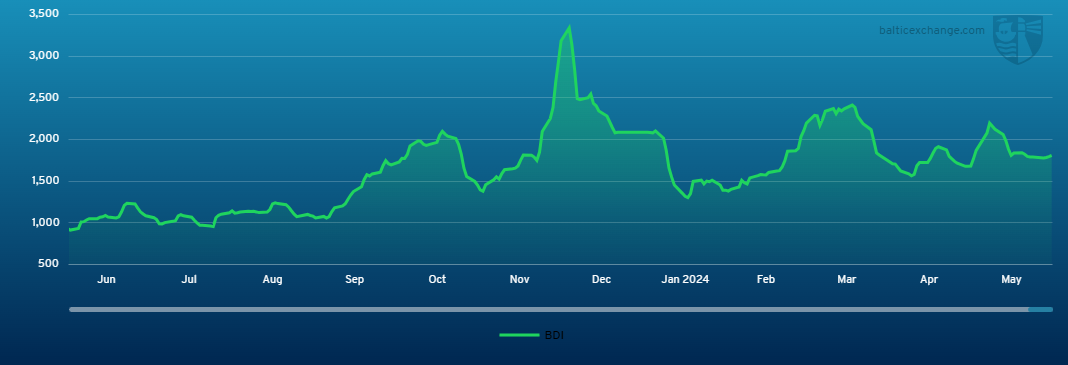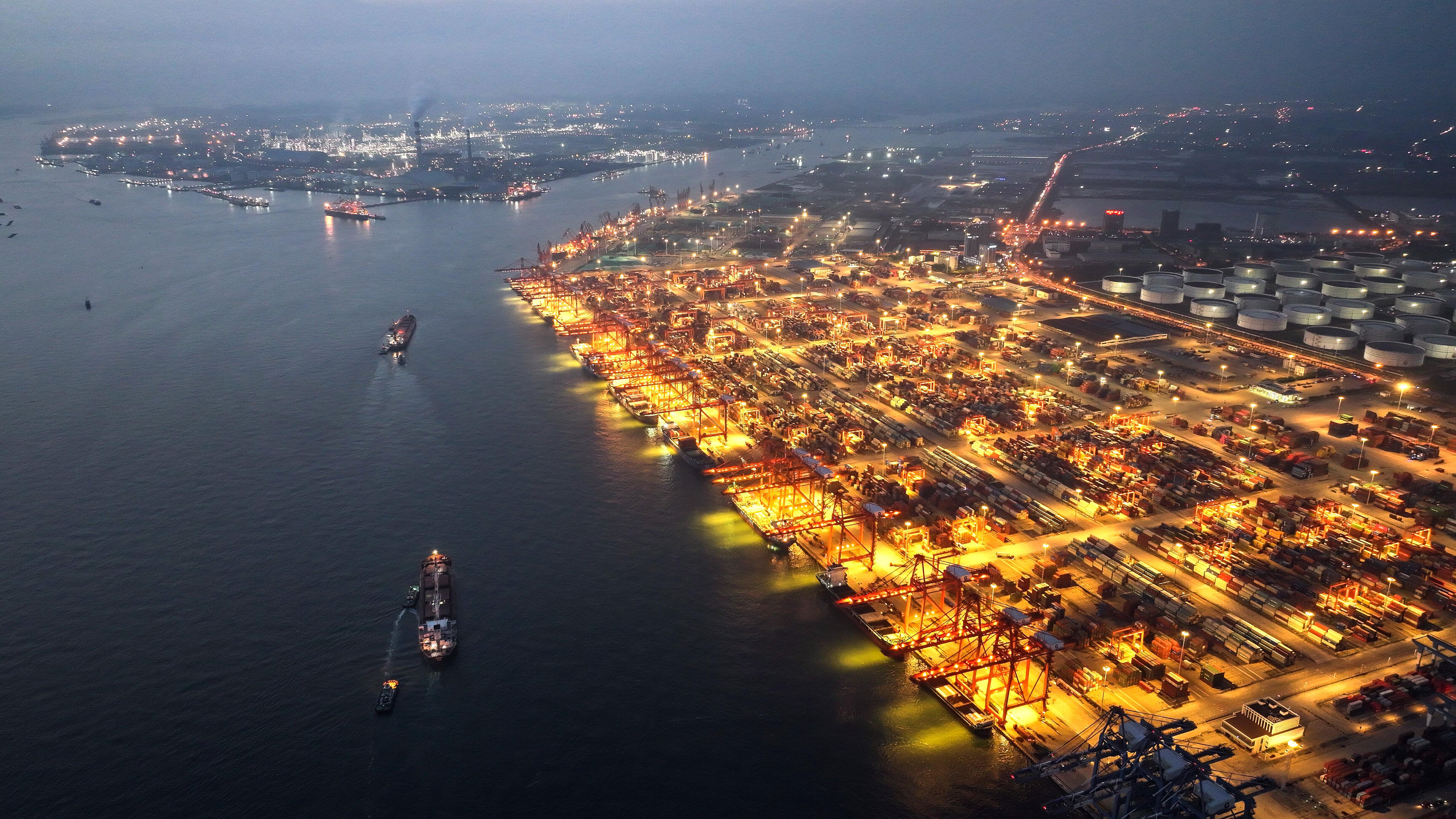BEIJING, June 3 (Xinhua) -- The Baltic Exchange has published its weekly report of the dry and tanker markets for May 27-31, 2024 as below:
Capesize
After a slow start due to a UK Bank Holiday, the market quickly regained momentum. The Pacific was notably active, with all three major miners actively fixing throughout the week. Initially rates struggled to gain traction as brokers reported an oversupply of early vessels. However, towards the latter part of the week, the Pacific benefited from an uptick in coal cargoes from Indonesia and east coast Australia, and operator activity, driving freight rates higher. As a result the C5 index rose by $1.15 this week, closing at $11.135. Early in the week, activity in the Atlantic was limited, but a tightening of tonnage was noted in the North. Midweek saw positive sentiment bolstered by increased fresh cargoes and strong fronthaul fixtures from east coast Canada to China, leading to substantial gains in the C9 index, which climbed $3,129 on the week, closing at $48,563. The south Brazil and West Africa to China routes experienced downward pressure due to an abundance of ballasting vessels, however, towards the end of the week some marginal gains were made. The week concluded positively, with the BCI 5TC increasing by $581 to close at $23,389.
Panamax
It proved to be a negative week for the Panamax market with rates easing across the board. The Atlantic remained predominantly fronthaul led with a steady grain cargo flow ex NC South America, continuing the recent theme of decent mineral demand ex US east coast to India, reports circulated mid-week of an 81,000dwt delivery Gibraltar at $25,100 for said run. However, with an easing trans-Atlantic market the plentiful ships available in the North came under pressure with reduced rates appearing, with no obvious signs of any floor. In Asia, sound volume of mineral demand ex Australia along with NoPac grains kept rates steady, but with South America not offering much support seeds of doubt were experienced across the basin. An 82,000dwt delivery South Korea was able to achieve $17,250 for a trip via Australia redelivery China, whilst ex Indonesia an 81,500dwt delivery Thailand agreed a shade below $18,000 for a trip via Indonesia redelivery South Korea.
Ultramax/Supramax
Another rather lackluster week as many areas saw little fresh enquiry compounding a rather dull market. The Atlantic saw limited opportunities from the Continent-Mediterranean, elsewhere the south Atlantic similarly saw little action. Despite little fixing information emerging some felt that a bottom may have been reached from the US Gulf as the week closed. A similar story from the Asian arena with lower cargo flows also affecting timecharter rates. In the Atlantic, A 51,000dwt open Ireland was fixed for a trip via Russian Baltic to south Brazil at $14,000. Otherwise, a 61,000dwt fixed delivery Recalada for a trip to West Africa at $18,000. In Asia, a 55,000dwt open south China fixed a trip via Indonesia redelivery EC India in the low $15,000s and a 58,000dwt open China's Taiwan fixed a trip via Indonesia to China in the low $16,000s. The Indian Ocean remained active although again sentiment remained poor, a 61,000dwt fixed delivery Port Elizabeth trip to China at $21,000 plus $210,000 ballast bonus.
Handysize
In a week of limited visible activity, a feeling of positivity was seen in sections of the handy sector. The south Atlantic began in a positive fashion, with adequate cargo availability, with a 38,000dwt fixing from Recalada to Denmark with an intended cargo of grains at $19,250 but as the week progressed, levels of fresh enquiry slowed and numbers were said to have stabilized. The Continent and Mediterranean continued to struggle for cargo availability, and a 33,000dwt fixed for a trip from north France to West Africa intention Abidjan with an intended cargo of grains at $8,750. The Pacific markets remained positive with fresh enquiry visible from Australia, Indonesia, China and the Pacific north-west. A 38,000dwt opening in Manzanillo was fixed for a trip to Singapore-Japan in the mid teens whilst a 37,000dwt was fixed from Chile to Singapore-Japan at around $17,000 but further details had yet to surface.
Clean
LR2
MEG LR2's saw freight levels fall off again this week. The TC1 rate for 75kt MEG/Japan sunk 30 points to WS240.56 and the 90kt MEG/UK-Continent TC20 voyage went from $7.79 million to $6.8 million.
West of Suez, Mediterranean/East LR2's improved for the second week on week. The TC15 index jumped up $429,000 to $4.08 million.
LR1
In the MEG, LR1 freight also took some downward pressure. The 55kt MEG/Japan index of TC5 went from WS293.75 to WS265. The 65kt MEG/UK-Continent of TC8 shed $635,000 to $5.34 million.
On the UK-Continent, a 60kt ARA/West Africa run on TC16 shot up 17 points to WS173.89.
MR
MR's in the MEG were also down significantly this week. The TC17 35kt MEG/East Africa is marked at WS380, down 34.29 points, following a Thursday reported fixture at this level.
On the UK-Continent MR's made a welcome resurgence this week. The 37kt ARA/US-Atlantic coast of TC2 got back up above the WS200 mark to WS201.88 (+23.44) tanking the Baltic TCE up to $24,203 per day round trip. The TC19 run (37kt ARA/West Africa) the index also went from WS199.06 to WS225.63.
USG MR's stole the show this week with a serious flurry of prompt enquiry driving the market upwards. TC14 (38kt US-Gulf/UK-Continent) shot up 103.21 points to WS245. The 38kt US Gulf/Brazil on TC18 similarly added 99.29 points to WS315. The 38kt US-Gulf/Caribbean of TC21 jacked up 141%, an increase of 882,000 to $1.51 million, with higher numbers for the run reported on subjects at time of writing.
Handymax
In the Mediterranean, 30kt Cross Mediterranean (TC6) improved 58.11 points this week to reach WS285 and them level off there for the moment.
Up in north west Europe, the TC23 30kt Cross UK-Continent improved a modest 4.17 points to WS225 where it also looks to have plateaued for the moment.
VLCC
The VLCC market continued a downward trend this week with the rate for the benchmark 270,000 mt Middle East Gulf to China falling 10 points to WS57.70 which provides a daily round-trip TCE of $35.305 basis the Baltic Exchange's vessel description.
In the Atlantic market a similar situation was apparent. The 260,000 mt West Africa/China was also weakened by 10 points to WS60.22 showing a round voyage TCE of $38,450 per day, and the rate for 270,000 mt US Gulf/China fell by $480,000 to $8,925,000 corresponding to a round-trip daily TCE of $45,583.
Suezmax
The Suezmax market in West Africa took an upward turn this week, helped by an improving US Gulf and Caribbean market. The rate for 130,000 mt Nigeria/UK Continent trip rose 4 points to WS114.89 (a daily round-trip TCE of $46,294). In the Mediterranean and Black Sea region the rate gained a meagre point to WS124 for the 135,000 mt CPC/Mediterranean trip (showing a daily TCE of $50,833 round-trip). In the Middle East, the rate for 140,000 mt Middle East Gulf to the Mediterranean (via the Suez Canal) gained five points to WS103.72.
Aframax
In the North Sea, the rate for the 80,000 mt Cross-UK Continent dipped by three points to a fraction above WS150 (a daily round-trip TCE of about $49,500 basis Hound Point to Wilhelmshaven).
In the Mediterranean market the rate for 80,000 mt Cross-Mediterranean lost 13 points this week to WS236.39 (basis Ceyhan to Lavera, that shows a daily round trip TCE of $83,037).
Across the Atlantic, excitement has started with the roller-coaster ride climbing and rates improving across all the Baltic routes. For the 70,000 mt east coast Mexico/US Gulf (TD26) the rate recovered 32 points to WS161.25 (a daily TCE of about $35,857 round trip) and the rate for 70,000 mt Covenas/US Gulf (TD9) was almost 29 points firmer than a week ago at WS156.56 (a round-trip TCE of $32,375 per day). The rate for the trans-Atlantic route of 70,000 mt US Gulf/UK Continent (TD25) rose by 31 points to WS191.11 (a round trip TCE basis Houston/Rotterdam of $46,406 per day). While these are healthy returns, further improvement is expected as there is still not enough encouragement for ballasters from Europe.
LNG
Despite what the LNG indices are suggesting there is life in the spot LNG market, several ships have been put on subs out in the Atlantic with laycans working July windows currently. There will be interest in the Mediterranean as well, with some reported FOB tenders coming into play, though none of this has done much to drive rates in either direction. The Pacific has seen some intra-Basin activity but overall there remains tonnage available to fix (one broker reported seven ships prompt).
Rate wise the BLNG1 Australia to Japan moved only $703 to settle at $46,938. BLNG2 Houston to the Continent showed a rise of $2,238 to close the week at $51,932 and BLNG3 Houston-Japan showed the greatest gains, of $3,024 to finish at $59,627.
Period for the LNG was quiet, after some recent gains rates are calming while charterers find it hard to find flexible and willing ships to fix over the winter period. 6-month rates were flat at $86,500 while the 1-year terms rose slightly to $80,967, and the 3-year period remained unchanged at $82,300.
LPG
A very quiet week for rates on the LPG market, out in the East where the routes hovered within $2-3 the only news was that a few Australian cargoes that were trading did so on premiums, while a replacement cargo ex Ras Tanura helped steady rates towards the end of the week. While those were being worked though one other charterer came out and fixed in the low $80's so there has been uncertainty on where we would end up. The rates for BLPG1 Ras Tanura-Chiba rose by $1.214 to a close of $83.857 giving a TCE earning equivalent of $66,840.
For the Atlantic market it has been extremely quiet once again, rates moved barely more than $1 over the week for both the BLPG2 and BLPG3 routes, but they did finish down overall but with very little to report this was expected. BLPG3 Houston-Chiba closed at $146.857 and a daily TCE earning equivalent of $71,961 down a $1 over on the week, while BLPG2 Houston-Flushing finished at $82 and $89,715 TCE daily earning equivalent which was a $0.40 cents drop.
Headquartered in London and a subsidiary of the Singapore Exchange (SGX), the Baltic Exchange publishes a range of indices and assessments which provide an accurate and independent benchmark of the cost of transporting commodities and goods by sea. These include the Baltic Dry Index (BDI), the dry bulk shipping industry's best known indicator. Published daily since 1985, this provides a snapshot of the daily spot market earnings of capesize, panamax and supramax vessel types on the world's key trading routes.

Chart shows Baltic Dry Index (BDI) during June 2, 2023 to May 31, 2024

Baltic Forward Assessment for BDI
In March 2018 the BDI was re-weighted and is published using the following ratios of time charter assessments: 40 percent capesize, 30 percent panamax and 30 percent supramax. The information is provided by a panel of international shipbrokers.
(Source: The Baltic Exchange, edited by Niu Huizhe with Xinhua Silk Road, niuhuizhe@xinhua.org)




 A single purchase
A single purchase









